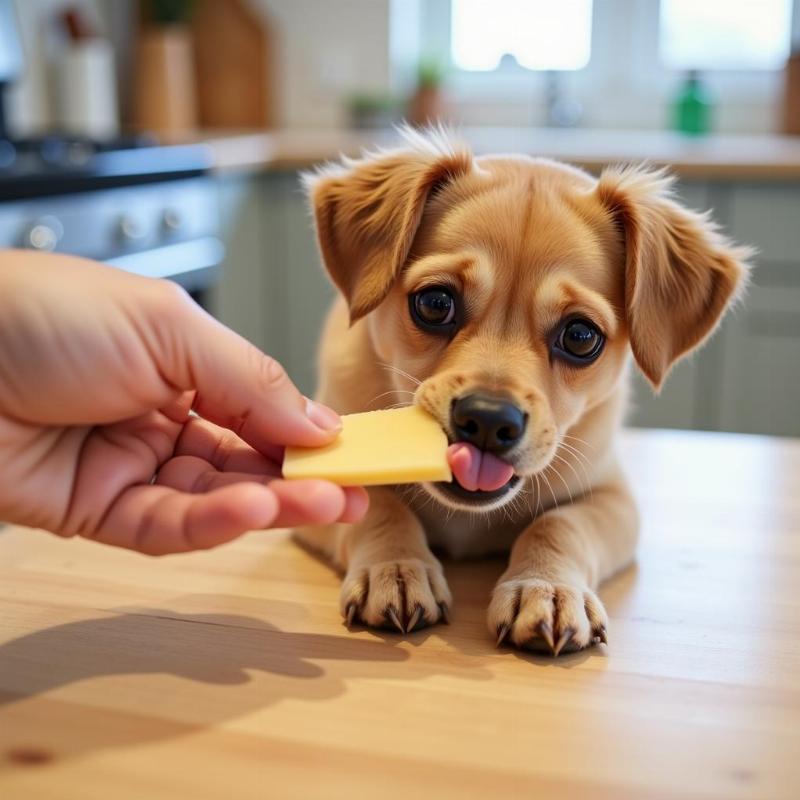Gouda cheese, with its rich, nutty flavor, is a favorite for many humans. But can our canine companions enjoy this Dutch delight, too? The simple answer is: in moderation. While Gouda isn’t inherently toxic to dogs, its high fat and sodium content can cause problems if fed in large quantities. Knowing how to safely give your dog Gouda, and when to avoid it altogether, is crucial for responsible pet ownership.
Understanding the Risks of Gouda for Dogs
Gouda cheese, like many other cheeses, contains a significant amount of fat. Too much fat in a dog’s diet can lead to pancreatitis, a serious and potentially life-threatening inflammation of the pancreas. Symptoms include vomiting, diarrhea, abdominal pain, and lethargy. Additionally, the high sodium content in Gouda can contribute to dehydration, high blood pressure, and even sodium ion poisoning in extreme cases.
 Dog eating Gouda cheese
Dog eating Gouda cheese
Can Dogs Have Gouda Cheese in Small Amounts?
While large amounts of Gouda are harmful, a small piece occasionally won’t necessarily harm a healthy dog. Think of it as a tiny, infrequent treat. However, certain dogs should avoid Gouda altogether. Dogs with pancreatitis, kidney disease, or sensitivity to dairy (lactose intolerance) should not be given Gouda. Even for healthy dogs, moderation is key.
How to Safely Give Your Dog Gouda Cheese
If you do decide to give your dog a small taste of Gouda, make sure it’s plain and doesn’t contain any added ingredients like garlic or herbs, which can be toxic to dogs. Low-sodium Gouda is a better option if available. Always introduce new foods gradually and monitor your dog for any adverse reactions.
Alternatives to Gouda Cheese for Dogs
Several healthier and safer treats are available that your dog will likely enjoy just as much, if not more, than Gouda. Consider dog-specific treats, fruits like apples or bananas (in moderation), or vegetables like carrots or green beans.
What to Do if Your Dog Eats Too Much Gouda
If your dog consumes a large amount of Gouda, contact your veterinarian immediately. They can advise you on the best course of action based on your dog’s size, breed, and overall health. Symptoms of Gouda cheese overdose in dogs might include vomiting, diarrhea, lethargy, and increased thirst.
Conclusion
While a small nibble of plain Gouda cheese might not harm a healthy dog, it’s generally best to avoid giving it regularly. The potential risks associated with its high fat and sodium content outweigh the benefits. Stick to dog-specific treats and healthy snacks to keep your furry friend happy and healthy. Remember, consulting with your veterinarian is always the best approach when introducing new foods into your dog’s diet.
FAQ
- Can puppies eat Gouda cheese? Puppies are even more sensitive to high fat and sodium than adult dogs. It’s best to avoid giving them Gouda cheese altogether.
- What type of cheese is safe for dogs? Low-fat, low-sodium cheeses like cottage cheese or mozzarella are generally safer options in small quantities.
- My dog ate a large piece of Gouda. What should I do? Contact your veterinarian immediately for advice.
- Are all cheeses bad for dogs? Some cheeses, like those containing garlic, herbs, or other potentially toxic ingredients, should always be avoided.
- What are some healthy treat alternatives to cheese? Fruits and vegetables like apples, bananas, carrots, and green beans can be given in moderation.
- Can dogs have smoked gouda? Smoked Gouda has even higher sodium content and should be avoided.
- Can my dog have a small piece of Gouda every day? Even small amounts of Gouda regularly can contribute to health issues over time. It’s best to offer it very infrequently.
Related Articles
Beautdogs.us is your premier online resource for comprehensive dog care information, breed specifics, and product recommendations. We cater to both novice and experienced dog owners, providing expert advice on everything from nutrition to training. As a trusted source for all things dog-related, we strive to empower you to provide the best possible care for your canine companion. For expert advice and tailored recommendations, contact us at [email protected] or call us at +1 501-555-7529. Visit Beautdogs.us for more helpful resources.